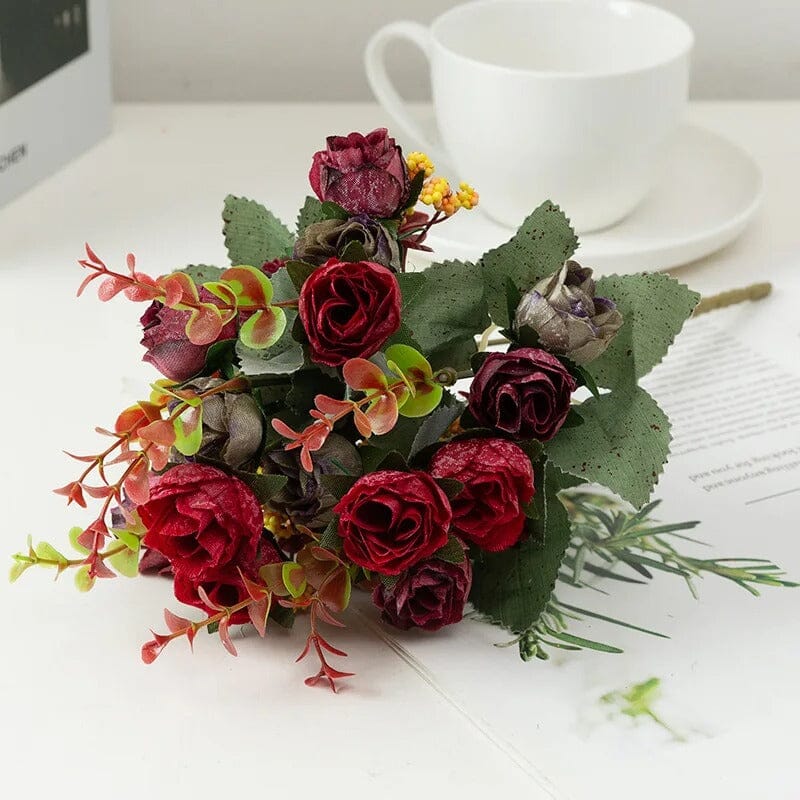🌸 Flowers in Religious Ceremonies: Rules and Uses 🌸
Discover how flowers symbolize respect, spirituality and homage in different religious traditions. 🌍
Introduction: Flowers, a universal link with the divine 🌺
For centuries, flowers have played a crucial role in religious ceremonies. They symbolize the fleeting beauty of life, hope, and spiritual peace. Yet, each religion has its own rules and meanings for the use of flowers in rituals. This article explores the specific uses of flowers in major religious traditions.
1. Flowers in Christian ceremonies ✝️
In Christian tradition, flowers symbolize resurrection and hope. 🌷 White lilies are particularly associated with purity and often used at funerals and Easter celebrations.

Flowers are also found in churches to adorn altars and religious celebrations such as weddings. Red roses symbolize divine love, while carnations can represent gratitude to the Virgin Mary.
2. Flowers in Buddhist rituals 🕉️
Flowers play a central role in Buddhist ceremonies. The lotus, in particular, is a sacred symbol representing spiritual purity and enlightenment. 🌸 Flower offerings in front of Buddha statues are a sign of respect and gratitude.

In funeral rituals, flowers are offered to remind us of the impermanence of life and to accompany prayers for the soul of the deceased.
🌺 Offer an eternal tribute to your departed loved ones 🌺
With this 32 cm artificial flower bouquet, combine elegance and durability to honor the memory of your loved ones. Weather-resistant, it offers a touch of timeless beauty.

A bouquet that lasts forever, like your memories 💞.
🌸 Discover and order now 🌸3. Flowers in Hindu ceremonies 🕉️
Flowers play a fundamental role in Hinduism. 🌺 They are offered to the gods during pujas (prayers) as a symbol of devotion. Jasmine , marigold and lotus are the most common flowers in these rituals.

At funerals, flowers are placed around the body of the deceased to express a final tribute, while praying for his spiritual release.
4. Flowers in Muslim ceremonies ☪️
In Islam, the use of flowers is limited compared to other religions. 🌼 However, it is common to place flowers on graves to honor the deceased, especially after Eid or during cemetery visits.
White flowers, such as lilies or roses, are favored because they symbolize purity and peace.

5. Flowers in Jewish ceremonies ✡️
Unlike other traditions, flowers do not play a central role in Jewish ceremonies. 🌻 However, it is possible to send bouquets as a form of condolence to bereaved families.
In some cases, flowers may be used at weddings to decorate the chuppah (bridal canopy).
Artificial Funeral Flowers: A Lasting Beauty to Honor Memory 🌸
Artificial funeral flowers offer an elegant and long-lasting alternative to honoring departed loved ones. Unlike fresh flowers, they do not wilt and retain their vibrancy over time, symbolizing an everlasting memory. These floral arrangements are designed to withstand the elements, making them ideal for cemeteries or memorials. Available in a variety of colors and styles, they allow each tribute to be personalized while respecting the tastes and memory of the deceased.
FAQ: Everything you need to know about funeral flowers 🌸
1. What are the most commonly used flowers for funerals?
The most common flowers are lilies (purity), roses (love), carnations (remembrance) and chrysanthemums (mourning, especially in Europe).
2. What is the meaning of the colors of funeral flowers?
White symbolizes peace and purity, red represents love, yellow can mean friendship or remembrance, and purple is associated with dignity and respect.
3. Are there specific traditions according to religions?
Yes, for example, flowers are central in Christian and Buddhist ceremonies, while they are less present in Jewish and Muslim rituals.
4. How long do flowers last on a grave?
Fresh flowers generally last between 3 and 7 days depending on weather conditions. For a longer duration, opt for resistant varieties or long-lasting arrangements.
5. What flower arrangement is ideal for a personal tribute?
Simple bouquets or sprays are perfect for a personal tribute. You can customize the arrangement according to the tastes of the deceased.
6. Can flowers be placed at any time of the year?
Yes, flowers can be placed at any time. However, certain periods such as All Saints' Day or death anniversaries are particularly popular.
7. What is the difference between a wreath and a funeral spray?
A sheaf is an elongated arrangement, often laid flat, while a crown is round and symbolizes the eternal cycle of life and death.
8. Can we personalize a floral arrangement?
Yes, most florists offer personalized arrangements based on colors, favorite flowers and the message you want to convey.
9. Should flowers be accompanied by a written message?
It is recommended. A short, heartfelt message, such as “Forever in our hearts” or “With all our love,” adds a personal touch to the tribute.
10. Where to buy funeral flowers?
You can purchase funeral flowers from local florists, online specialty stores, or directly from funeral services that offer custom arrangements.
Conclusion: A universal language 💐
Flowers are more than just decorations: they express our emotions, our respect and our connection to the sacred. 🌼 Whether through offerings, prayers or funeral tributes, they remind us of the beauty and fragility of life.
Take the time to understand the meanings and traditions associated with flowers in religious ceremonies to make your gestures even more meaningful. 🙏












Leave a comment